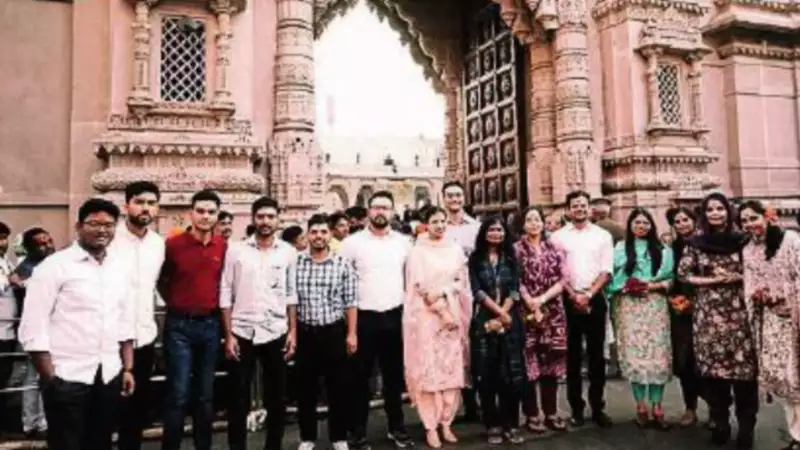A batch of 17 Indian Administrative Service (IAS) probationers recently visited Kashi Vishwanath Dham to learn about religious management from temple authorities. The event, which included offering prayers, seeking blessings of the deity, and interacting with the temple’s Chief Executive Officer and Deputy Collector, has sparked debates on the constitutional and statutory obligations of public servants in a sovereign secular socialist democratic republic i.e., India. This incident is part of a broader pattern of increasing religious involvement by civil servants, raising questions of neutrality, constitutional morality, and administrative conduct.
Public servants and constitutional obligations
Under the Indian Constitution, IAS officers are bound by principles of secularism and non-discriminatory governance. Articles 25-28 of the Constitution establish the framework of religious freedom, explicitly prohibiting the state from promoting or endorsing any particular faith. Additionally, the All-India Services (Conduct) Rules, 1968, specifically Rule 5(1), mandate that civil servants must maintain political and religious neutrality in official functions and refrain from activities that could be construed as aligning with any religious ideology. The question arises: Does this visit align with these constitutional mandates, or does it indicate a shift towards a religiously aligned bureaucracy?
Religious bureaucracy: A growing trend?
- Babri masjid demolition and civil servants’ involvement
This is not the first time such an event has occurred. Since the demolition of Babri Masjid in 1992, there has been a visible shift in the engagement of public servants in religious affairs. A senior IAS officer from the 1992 batch recently admitted to celebrating the Babri Masjid demolition while undergoing training in Mussoorie. In her social media post, she justified the act, calling it a moment of “something powerful, something positive, something auspicious.” The revelation underscores a troubling history of bias within the bureaucracy and the risks of a majoritarian outlook creeping into civil services.
- Lifting of the ban on civil servants in RSS
In 2023, the Central Government revoked a 58-year-old ban on civil servants participating in RSS activities, further eroding the secular principles of governance. Critics argue that the RSS ideology conflicts with constitutional morality, which emphasizes pluralism and inclusivity. This move has sparked significant debate on whether civil servants can maintain impartiality while being affiliated with an organization that has strong ideological leanings. The decision raises concerns about the politicization of the bureaucracy and its impact on the neutrality of administrative functions.
- The Kerala WhatsApp group controversy
The Kerala government recently suspended two IAS officers, K. Gopalakrishnan and N. Prasanth, for misconduct related to a religion-based WhatsApp group. Gopalakrishnan allegedly created the group, named “Mallu Hindu Officers,” which included only Hindu officers, prompting objections for violating secular values. Following widespread criticism, the group was deleted, and Gopalakrishnan claimed his phone was hacked. Intelligence agencies raised concerns over this first instance of a religiously exclusive group among IAS officials. This incident follows another controversy involving IPS officer M.R. Ajith Kumar, who faced scrutiny for meeting RSS leaders without government approval. The Kerala government swiftly suspended the officers, reinforcing the principle that religion should not influence administrative duties.
- The Tamil Nadu preaching controversy
Tamil Nadu IAS officer C. Umashankar, a 1990 batch officer, was prohibited by the state government from engaging in religious preaching. A Dalit Christian convert, he had been leading evangelical sessions, arguing that his fundamental rights under Article 25 of the Constitution allowed him to propagate his faith. The Tamil Nadu government, however, warned that this violated the All-India Services (Conduct) Rules, 1968, which require civil servants to remain neutral in religious matters. Former Cabinet Secretary T.S.R. Subramanian commented that civil servants cannot publicly profess religion and must either resign or abide by service rules.
Impact on governance and public perception
The IAS probationers’ visit and other recent developments have broader implications for secular and non-discriminatory governance. If civil servants are trained in the management of Hindu temples, should similar training be extended to mosques, churches, and gurdwaras? These incidents raise concerns over bureaucratic alignment with religious institutions. The increasing alignment of bureaucracy with religious groups erodes constitutional democracy, which is based on pluralism and separation of powers. Minority communities may perceive bias in governance, weakening trust in an impartial administration.
The way forward
While public servants must understand diverse cultural and religious contexts, their training and conduct should be neutral and inclusive, covering all major religious institutions. They must avoid direct participation in religious rituals and focus on administrative management rather than religious engagement. Adhering to strict secular principles is essential to prevent the politicisation of the bureaucracy. With secularism as a basic feature of the Constitution, ensuring that public servants uphold neutrality is crucial.
These recent developments, from WhatsApp group exclusivity to bureaucratic celebrations of Babri demolition and participation in religious management, raise critical questions on the evolving relationship between state and religion—questions that India must address to remain true to its constitutional ethos.
Related:
When the Supreme Court Firmly De-linked Religion from Politics

